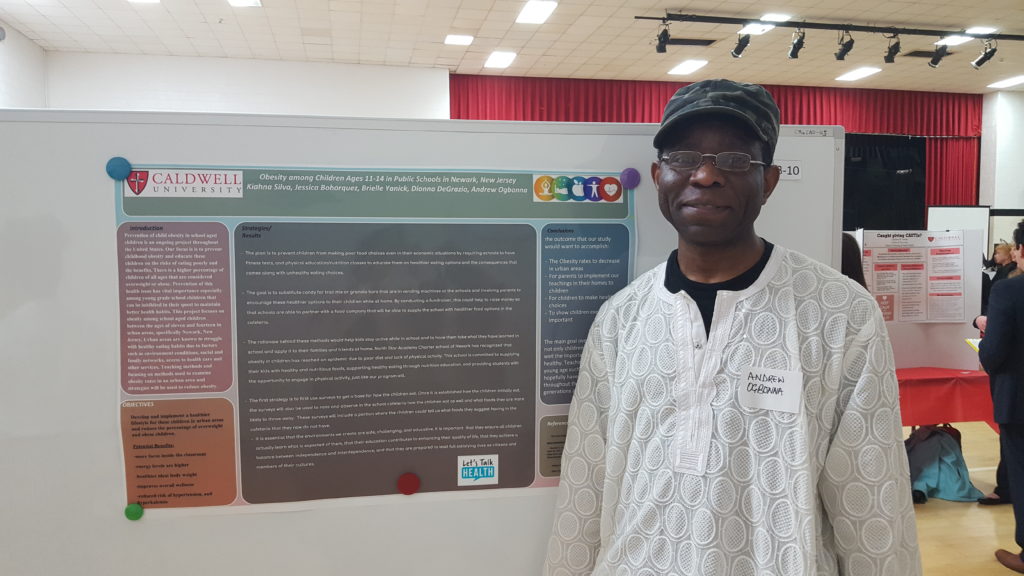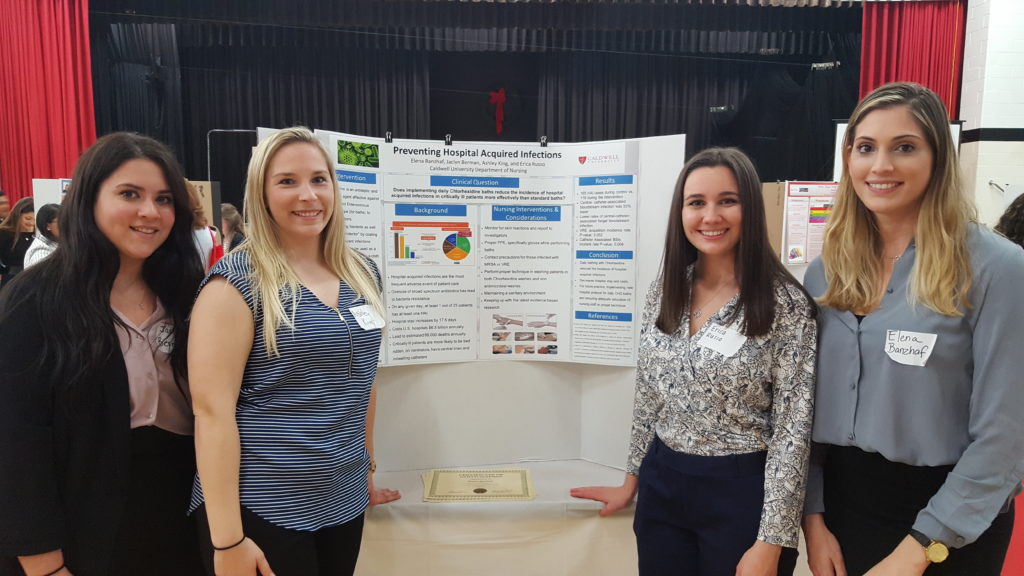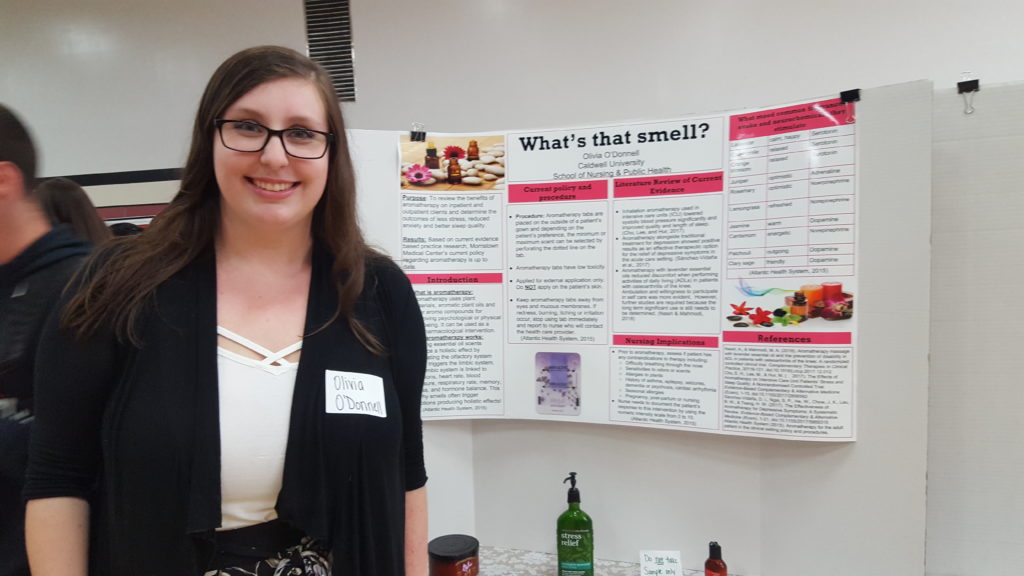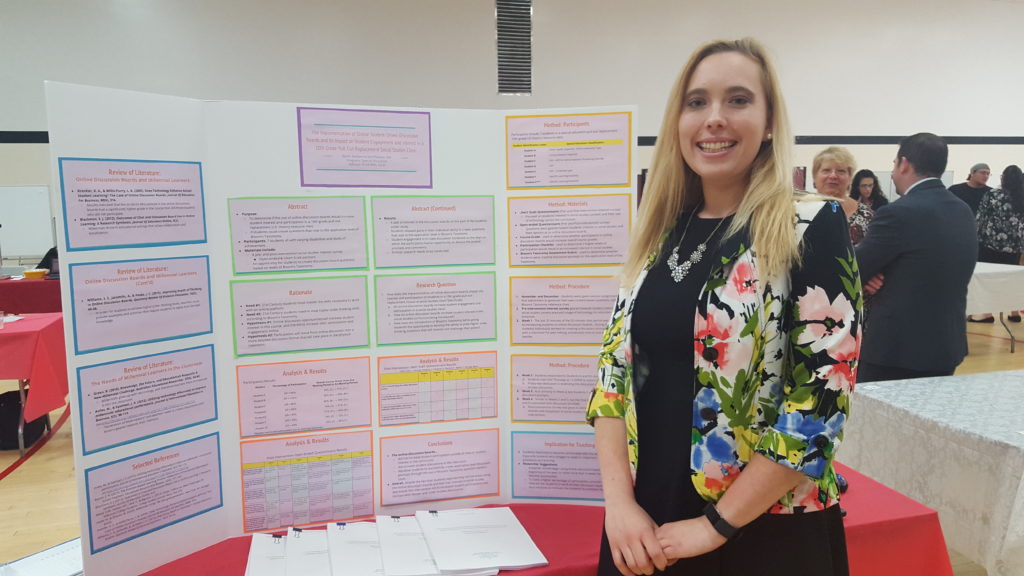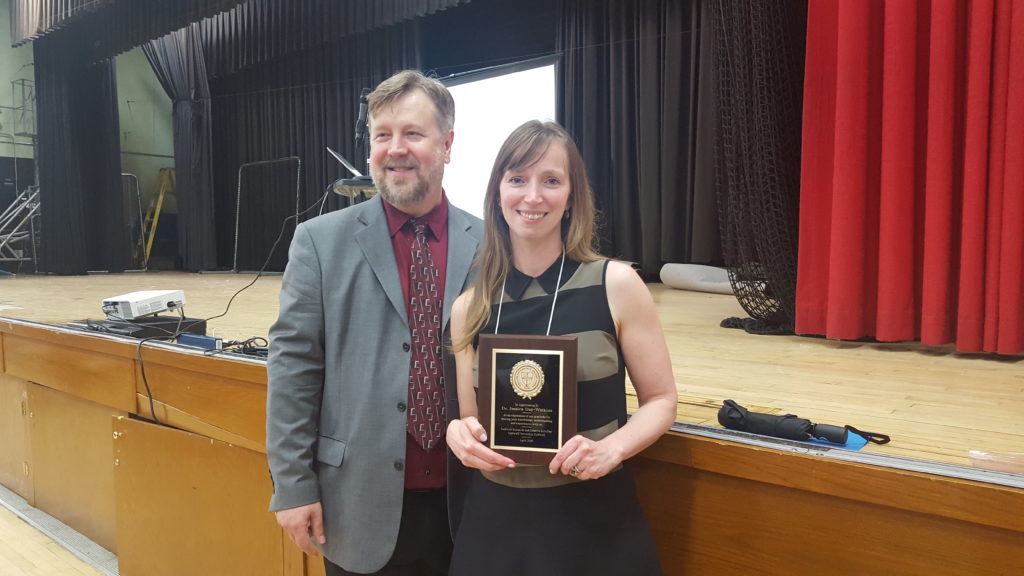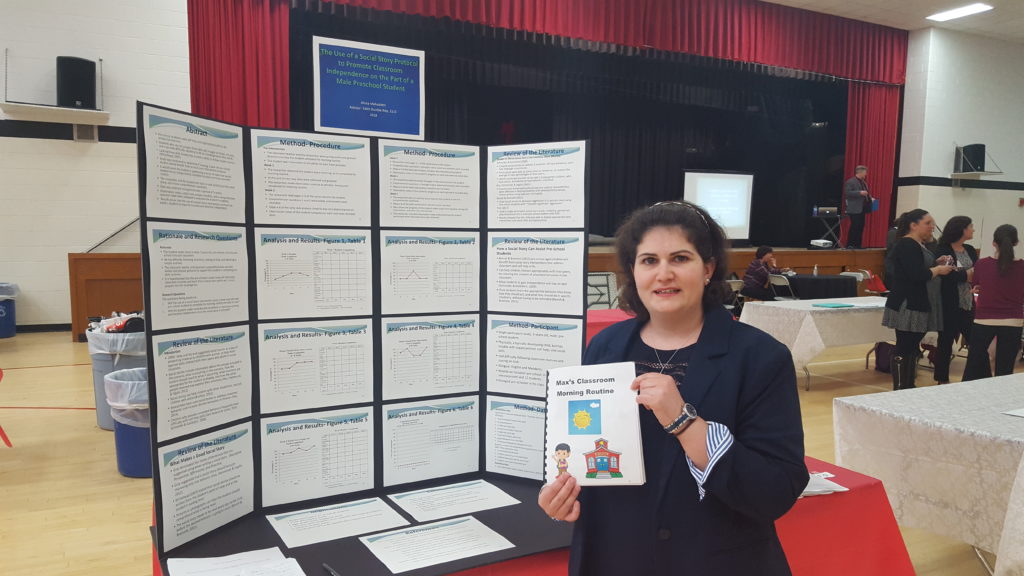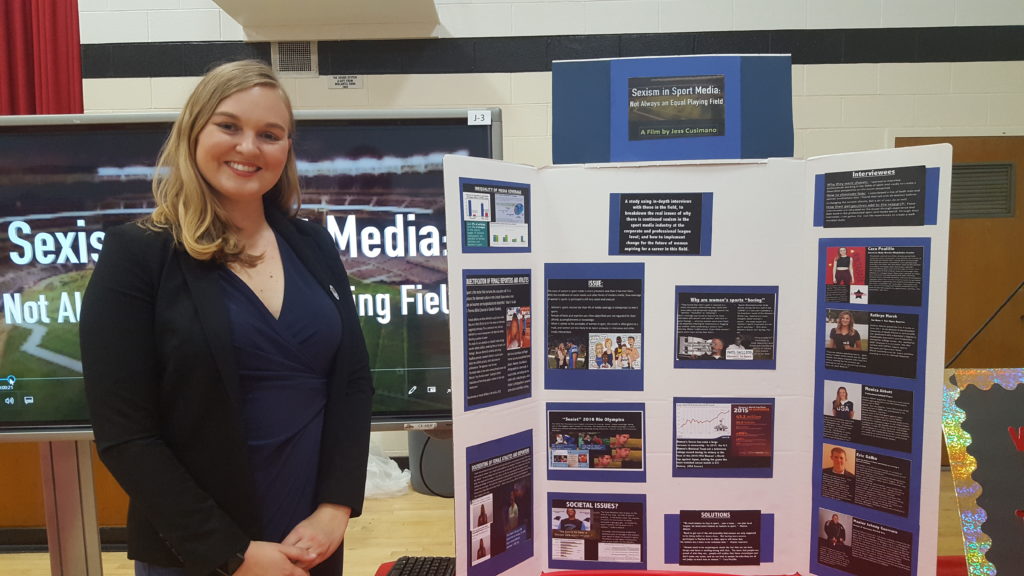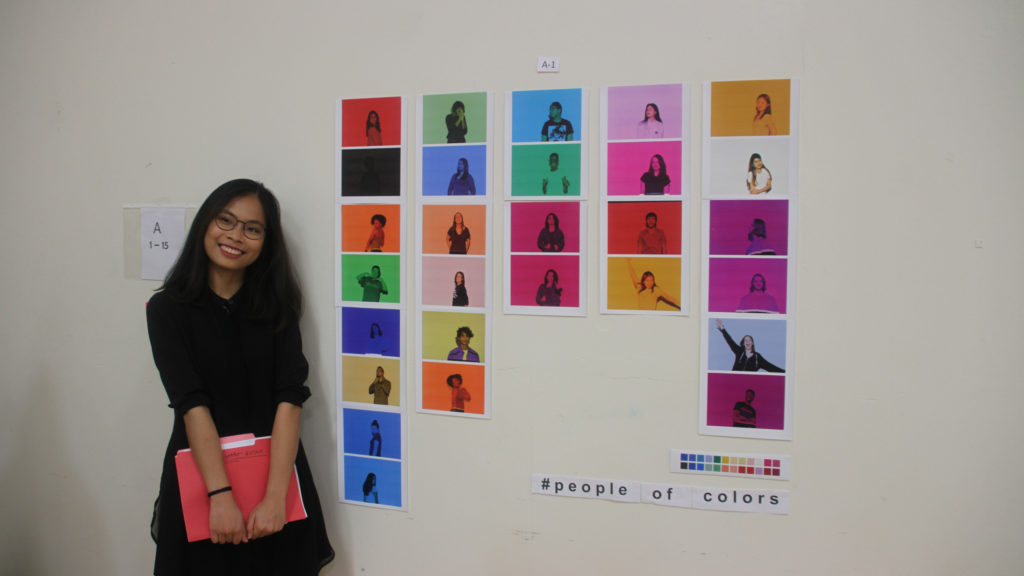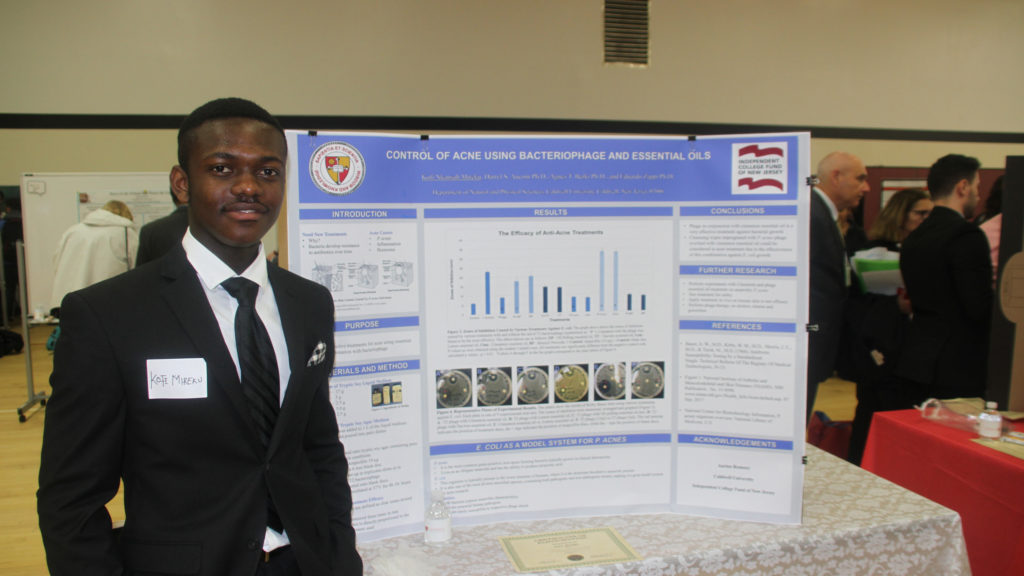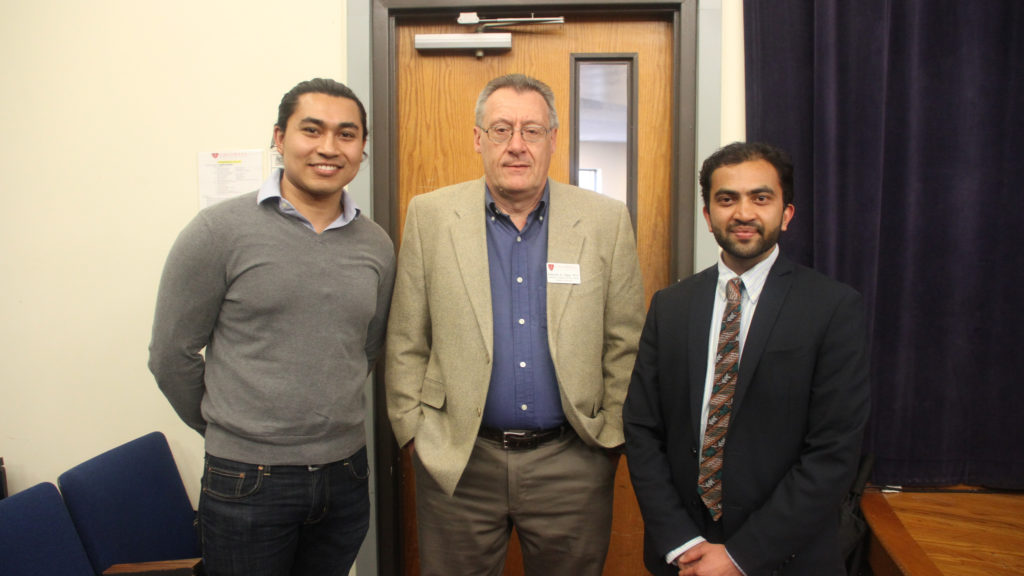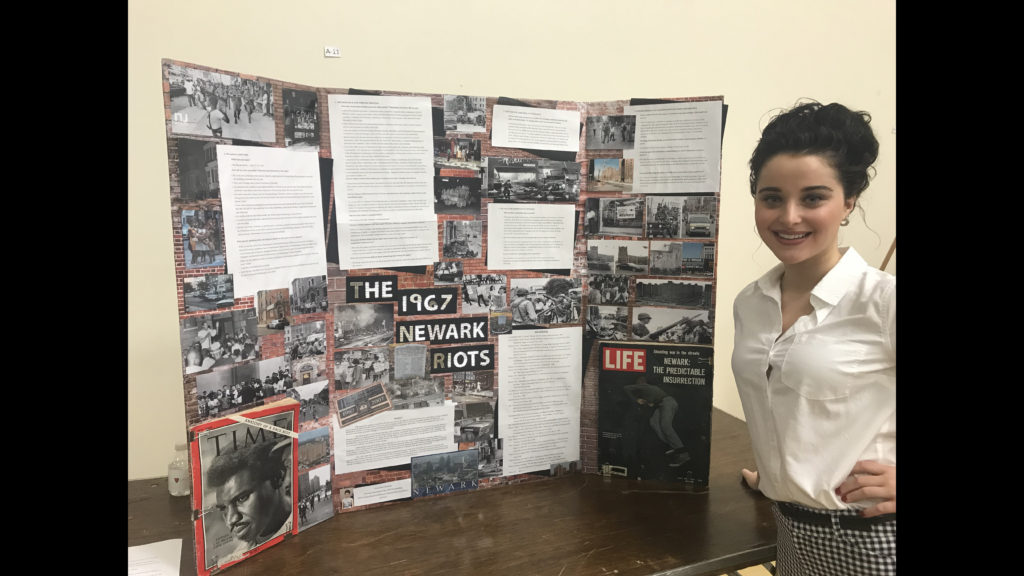Caldwell University
April 30, 2018
Research and Creative Arts Day highlights theme “Even the smallest person can change the course of the future”
Caldwell, N.J., April 30, 2018 – Students displayed nearly 150 research undergraduate and graduate projects at the second annual Caldwell University Research and Creative Arts Day on April 25. This year’s theme was taken from a quote from writer J.R.R. Tolkien’s “The Lord of the Rings,” “Even the smallest person can change the course of the future.” The day was planned in memory of Judith Croce, professor of art, who passed away last May.
The Student Center gym was packed for the entire day so that visitors could come and speak to the students and learn about their research. Awards were presented at Honors Convocation that evening.
Some of the undergraduate projects
Biology student Eliane F. Tsopmegha was excited to showcase her research on “Are Makeup Tools Safe? Can They Be Sources of Contamination or Infection?” Since she likes makeup and doing research, she wanted to know whether the products could be harmful. She looked at the safety of makeup brushes and sponges, a vanity table and the makeup. Her results showed harmful bacteria. As a result, she recommends washing makeup applicators on a weekly basis and discarding them after three months of use. The research aspect was so intriguing that it reinforced her interest in wanting to apply to schools to pursue a Ph.D. in molecular and cellular biology. Her advisor was Dr. Agnes Berki, associate professor of natural and physical sciences.
Recent political science graduate Katherine Llangari did her project on “The U.S. Withdrawal from the Trans-Pacific Partnership: An Analysis of the Effects.” The soon-to-be law student said it is important to understand that political science is not isolated, that history and economic issues affect everything in a globalized world. Her advisor was Dr. Domenic Maffei, chair of the Department of History and Political Science.
“Reduction of Airborne Microorganisms Indoors with Essential Oils” by Eva Kenfack Ngapgue, a senior biology student, examined how airborne infections afflict millions of people annually worldwide and how sterilizing indoor air is too costly. “I was very interested in this topic. I’m a commuter, I volunteer at a hospital and I have younger siblings, so I wanted to see if there was something cheaper and effective.” Her findings suggest essential oil diffusers are effective in reducing the number of bacteria and molds/fungi in the air and can be used as affordable air sterilizers. Her advisor was Dr. Berki.
Huong Nguyen, a communication and media studies student, did her project on “People of Colors” to raise awareness about racial and color discrimination. “It was a chance to combine my interest in digital art with the social sciences,” she said. Her advisors were Dr. Berki and Dr. Bonnie French.
Zaira Baranukova, a senior nursing student, explored the toxic effects of digoxin for patients with atrial fibrillation. Baranukova, who works on a cardiac floor for her nursing clinicals, said she sees what happens to patients with heart issues, so the topic interested her. “I offered an alternative procedure called the LARIAT procedure,” which she found had far more positive outcomes than digoxin. Her advisor was Dr. Kathleen Kelley, associate professor and assistant director of the School of Nursing and Public Health.
Averi Zarbetski, a senior history student, did research on “The 1967 Newark Riots.” With a pictorial display of newspaper and magazine articles of the time, she documented how the city was shaken to its core over a five-day period in July of that year. “I had always heard about it from my grandparents,” said Zarbetski. That , along with her passion for history, led her to want to explore that period in the history of the city of Newark. Her advisor was Dr. Marie Mullaney, professor of history.
Some of the graduate projects
Kelly Neill, a student in the master’s in literacy instruction program, did a project titled “Will the Use of Multisensory Instruction Improve a First Grader’s Phonemic Awareness and Overall Attitude Toward Spelling and Phonics? The Study of a First-Grade Student.” She is planning to work as a child life specialist, and she said this project helped her think about more opportunities for doing research in that field. Her advisor was Dr. Edith Ries, professor of education.
Leif Albright, who recently completed his Ph.D. in applied behavior analysis (ABA) at Caldwell, researched “Nodality and the Relative Strengths of Transitive and Equivalence Relationships” with Caldwell ABA faculty members Ken Reeve and Sharon Reeve. “It gave me a line of research that I enjoy pursuing and helped me as a practitioner,” said Albright, who works as an assistant director of a children’s center in Manhattan.
Adrienne Jennings, an ABA doctoral student and colleague of Daniel Ferman and Leif Albright, both recently graduated ABA students, researched “Teaching Religious Literacy Using Stimulus Equivalence Technology,” which was aimed at helping students become familiar with other religions and their practices. “We found that there are efficient ways to teach religious literacy even in the public school setting,” said Jennings. Their advisor was Dr. Ken Reeve.
Alissa Mahadeen, a student in the master’s in special education program, did her research on “The Use of a Social Story Protocol to Promote Classroom Independence on the Part of a Male Preschool Student.” She wrote a social story to help a child who did not know how to unpack his backpack when he came to school. As a result of the social story, he began to unpack his backpack. She was able to develop a rapport with him where he came to her for help when he needed to put his coat and shoes on. Her advisor was Dr. Edith Ries, professor of education.
Keynote speakers
The undergraduate session keynote speakers were biology alumnae Anup Khanal, a research technician at Cold Spring Harbor Laboratory in New York, and Dennis Maharjan, a Ph.D., a student at Cold Spring Harbor. The graduate session keynote, “Exploring the Benefits of Graduate Research Training,” was given by Caldwell applied behavior analysis Ph.D. alumna Jessica Day-Watkins, a behavior analyst at Drexel University.
There was a three-minute thesis competition, which challenged graduate students to present their research in 180 seconds with no research notes in front of them. Danielle Hamblin, who will be receiving a doctoral degree in Educational Leadership with a special education concentration, was the winner.
Dr. Barbara Chesler, vice president of academic affairs, said the event was a testament to the Caldwell University community of scholars and the individualism provided to Caldwell students to advance their education. “In doing research projects, faculty and students journey together,” said Chesler. “Rather than simply telling students about the how and why of a given process of discovery, students are engaged in that discovery. Students come to the research or creative project as a novice and they leave as an expert,” said Chesler. “These projects highlight the importance of a liberal arts education where critical and creative thinking, along with problem-solving, are the core of how and what we teach at Caldwell.”
The day was arranged by the Research Task Force, volunteer faculty and staff members along with several undergraduate student organizers.






